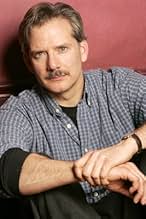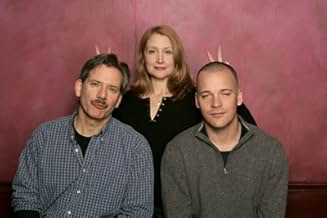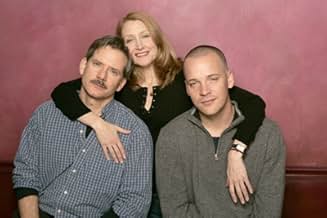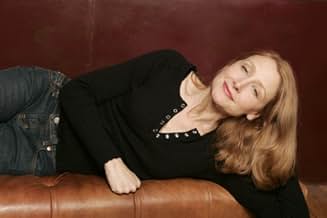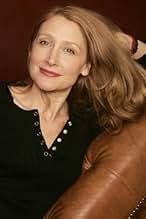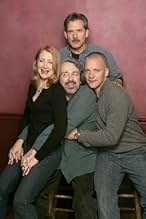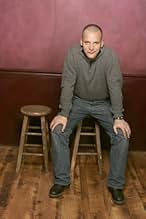IMDb RATING
6.4/10
2.5K
YOUR RATING
A grief-stricken screenwriter unknowingly enters a three-way relationship with a woman and her film executive husband - to chilling results.A grief-stricken screenwriter unknowingly enters a three-way relationship with a woman and her film executive husband - to chilling results.A grief-stricken screenwriter unknowingly enters a three-way relationship with a woman and her film executive husband - to chilling results.
- Awards
- 1 win & 2 nominations total
Craig Hamrick
- Party Guest
- (voice)
- (uncredited)
Jason-Shane Scott
- Robert's Masseuse
- (uncredited)
Bridgetta Tomarchio
- Female Guest
- (uncredited)
- Director
- Writer
- All cast & crew
- Production, box office & more at IMDbPro
Featured reviews
Despite the earnest work of three talented actors, "The Dying Gaul" is a slow and ponderous film that betrays its stage origins. Unfortunately, the film opens with a scene that seems improbable, if not downright impossible, as a film producer attempts to purchase an original screenplay from a first-time writer who plays coy over principles, despite a million-dollar carrot. Before long, the producer seduces the writer, and the two men carry on an illicit affair behind the back of the producer's wife. However, the wife is intrigued after meeting the writer, and she begins to correspond with him in on-line chat rooms under the guise of a gay man. The sham that the wife uses to uncover the affair and psychologically harass the young writer would not fool anyone, let alone an educated writer, and the film falls apart from lack of credibility. Although Hitchcock may have been able to make lengthy scenes of two characters instant-messaging each other over a computer into classic cinema, director Craig Lucas has yet to hone those skills, and the instant-messaging exchanges are leaden to be polite. Fortunately, my watch has a dial that illuminates in the dark. The direction of the film in general is slowly paced, and there is little visual excitement or breaking through the boundaries of the stage-bound dialog.
Fortunately, the always-wonderful Patricia Clarkson plays the wife, and she does wonders with a part that is not intrinsically interesting. While Peter Sarsgaard generally falls into the "always-wonderful" category as well, his subtly mincing shtick as the gay writer seems as though it were lifted from the worst episodes of "Will and Grace." Sarsgaard played a gay (or bisexual) man far more convincingly in "Kinsey." While there certainly are effeminate and fey gay men, those stereotypes have already been played to death on screen, and a fresher concept would have been expected of an actor with the talents of Sarsgaard. Campbell Scott plays his part well, although, when a viewer's mind wanders to thoughts of how well Scott is aging, the actor is apparently not fully engaging the audience's attention.
"The Dying Gaul," while not a complete failure, is nonetheless a disappointment and little more than an acting exercise for three talented performers. The wordiness and leisurely pacing may have worked on stage, and the flimsy plot devices may also have played more credibly in the theater. However, on film, "The Dying Gaul" fails to engage or convince and ultimately falls flat.
Fortunately, the always-wonderful Patricia Clarkson plays the wife, and she does wonders with a part that is not intrinsically interesting. While Peter Sarsgaard generally falls into the "always-wonderful" category as well, his subtly mincing shtick as the gay writer seems as though it were lifted from the worst episodes of "Will and Grace." Sarsgaard played a gay (or bisexual) man far more convincingly in "Kinsey." While there certainly are effeminate and fey gay men, those stereotypes have already been played to death on screen, and a fresher concept would have been expected of an actor with the talents of Sarsgaard. Campbell Scott plays his part well, although, when a viewer's mind wanders to thoughts of how well Scott is aging, the actor is apparently not fully engaging the audience's attention.
"The Dying Gaul," while not a complete failure, is nonetheless a disappointment and little more than an acting exercise for three talented performers. The wordiness and leisurely pacing may have worked on stage, and the flimsy plot devices may also have played more credibly in the theater. However, on film, "The Dying Gaul" fails to engage or convince and ultimately falls flat.
I just saw this at the Seattle Film Festival, Peter Saarsgard was there to answer questions. The movie is extremely watchable for the first half of the way through, is built on a fascinating premise with interesting characters (a bisexual movie producer and his wife who reside in a Lifestyles of the Rich And Famous type beachside modern mansion, a young gay writer whose lover has died of AIDS), and builds to a pitch of extreme suspense. After that, however, the plot stumbles and the film's conclusion turns on a series of unbelievable events. I thought since the movie was based on a play, the plot would be clear, but it's almost as if the movie version was forced to cut out some important sequences, as there is never quite enough information about 1) how the woman obtains all her inside information on the writer, 2) how the writer's ex-wife was related to the characters and 3) most importantly, what happens to the characters at the end of the movie.
I went into the bathroom after the movie and joined a lineup of women who were also asking each, "What exactly happened there?" --- when it's not clear it's a sign of unclear movie-making.
I went into the bathroom after the movie and joined a lineup of women who were also asking each, "What exactly happened there?" --- when it's not clear it's a sign of unclear movie-making.
Suppose you had intimate knowledge about someone, and that someone did not know that you knew. How would you use that knowledge? Or would you? This issue is the undercurrent that carries the film's plot, like a fast moving stream, over a cliff, to a swirling, uncontrollable emotional vortex that changes people's lives forever.
Set in modern Los Angeles, a grieving gay screenwriter named Robert (Peter Sarsgaard) meets with Jeffrey (Campbell Scott), a wealthy film producer, to talk about Robert's script "The Dying Gaul", a tribute to his deceased lover and soul mate. Jeffrey invites Robert to his mansion by the ocean to meet his wife Elaine (Patricia Clarkson), who reads Robert's script and loves it. Over time, Robert and Elaine become friends, which sets up a triangular relationship that careens out of control when the anonymity of internet chat rooms provides cover for the discovery of secrets.
Artsy in tone and philosophy, the film exudes New Age dialogue, with conversation about Buddhist Karma, "the middle way", enlightenment, and deadly plant roots. The film's production design is chic. And while the color cinematography is mostly conventional, sometimes it is beautifully stylistic. I really liked those stark human silhouettes against that orange screen. The film's score, which connotes New Age spiritualism, is terrific.
Acting of the three leads is quite good. Patricia Clarkson is great as she sits in front of a computer monitor and, without speaking, displays myriad emotions through her facial expressions alone.
The chat room scenes are creative and emotionally potent, amid magnified keyboard clicking sounds. The back and forth exchange here is unusual, and striking in that it is meaningless when taken out of context, but highly enlightening when considered in relation to the film's plot, as this sample shows: "Hello"; "I hear clicking"; "I'm still here"; "Are you still there?"; "Yes"; "You sound really distracted"; "Yeah today"; "When?" "I'm sorry"; "No, I'm all yours"; "Are mine what?"; "No"; "Yes"; "Meaning?"; "I'm all yours now".
The film's screenplay does contain a rather obvious plot hole. And a couple of scenes involving Robert's son and former wife are too tangential to the story's trajectory. But these are minor issues.
"The Dying Gaul" may seem artistically or philosophically pretentious to some viewers. But I really liked it. Quite aside from the wonderful performances and the chic production values, the film's story has thematic depth, a quality lacking in most mainstream Hollywood films.
Set in modern Los Angeles, a grieving gay screenwriter named Robert (Peter Sarsgaard) meets with Jeffrey (Campbell Scott), a wealthy film producer, to talk about Robert's script "The Dying Gaul", a tribute to his deceased lover and soul mate. Jeffrey invites Robert to his mansion by the ocean to meet his wife Elaine (Patricia Clarkson), who reads Robert's script and loves it. Over time, Robert and Elaine become friends, which sets up a triangular relationship that careens out of control when the anonymity of internet chat rooms provides cover for the discovery of secrets.
Artsy in tone and philosophy, the film exudes New Age dialogue, with conversation about Buddhist Karma, "the middle way", enlightenment, and deadly plant roots. The film's production design is chic. And while the color cinematography is mostly conventional, sometimes it is beautifully stylistic. I really liked those stark human silhouettes against that orange screen. The film's score, which connotes New Age spiritualism, is terrific.
Acting of the three leads is quite good. Patricia Clarkson is great as she sits in front of a computer monitor and, without speaking, displays myriad emotions through her facial expressions alone.
The chat room scenes are creative and emotionally potent, amid magnified keyboard clicking sounds. The back and forth exchange here is unusual, and striking in that it is meaningless when taken out of context, but highly enlightening when considered in relation to the film's plot, as this sample shows: "Hello"; "I hear clicking"; "I'm still here"; "Are you still there?"; "Yes"; "You sound really distracted"; "Yeah today"; "When?" "I'm sorry"; "No, I'm all yours"; "Are mine what?"; "No"; "Yes"; "Meaning?"; "I'm all yours now".
The film's screenplay does contain a rather obvious plot hole. And a couple of scenes involving Robert's son and former wife are too tangential to the story's trajectory. But these are minor issues.
"The Dying Gaul" may seem artistically or philosophically pretentious to some viewers. But I really liked it. Quite aside from the wonderful performances and the chic production values, the film's story has thematic depth, a quality lacking in most mainstream Hollywood films.
"The Dying Gaul" feels like an updated "Who's Afraid of Virginia Woolf?" set in Hollywood instead of academia. But it gradually veers towards "Fatal Attraction" as the opening jabs at commercial film-making, with lots of name and title dropping that seem to be writer Craig Lucas's revenge on compromises he made for his successful "Prelude to a Kiss," give way to catastrophic psychological manipulation.
The initial Hollywood commentary is emphasized through the settings, as the movie producer, Campbell Scott, and his ex-writer/liberal activist/household and children manager wife, Patricia Clarkson, live in an extraordinary house with a rippling pool and ocean view. Their financial success is wielded like a weapon as the camera restlessly swoops around all their possessions, household help and scenic property. The emotional price he's paid for this is clear as Scott's "Jeffrey" could be in "Glengarry Glen Ross" (to drop film titles like he does) as he'll clearly do anything to seal a deal.
Peter Sarsgaard drives on to the studio lot and into their lives with a completely different character from his four other released films this year, with inflections and body language that only occasionally get a bit too flamboyant as affectations of an out gay writer discussing issues of sexuality in the movies and his late lover. His grief and need for human warmth is so palpable that it is even believable that after failing with psychological counseling and Buddhism to deal with it, he clutches at what used to be called spiritualism, here delivered through the internet, shown visually both in the written word and the actors talking to the camera like reading aloud from their computer screens, edited effectively in the best key scenes with real life.
Clarkson is wonderful as she morphs from busy housewife lounging in a fetching bikini, to curious dabbler in the dark side, to woman scorned and revengeful manipulator. She may be the Ultimate Scary Mother, sexy, maternal and controlling, who while distraught over violent video games goes after the psyche. Unusually for how such a triangle has been portrayed in films (and the film is specifically set in 1995 as perhaps a more innocent time), we also get brief, sympathetic insight on another woman similarly affected by the writer's selfish actions that puts Clarkson's "Elaine" in perspective as she could have been portrayed as more of a brittle harpy. But each character alternately attracts and repels us.
In his directing debut Lucas does not well serve his own script, adapted from his play, as it could have been a lot tauter in exploring the slippery slope of ethics in human relationships, that all it takes is that one small step to deceive or keep secrets before one falls into the well. There could have been a lot fewer arty scenes in silhouette, at sunset, across water.
The Steve Reich music throughout becomes more irritating than tension-inducing.
While the title has something to do with the writer's long monologue about the significance of the Roman sculpture as an artist's way to make victims sympathetic, one is left here more with the feeling that these three folks deserve each other, though the collateral damage left in their wake is a tragedy.
The initial Hollywood commentary is emphasized through the settings, as the movie producer, Campbell Scott, and his ex-writer/liberal activist/household and children manager wife, Patricia Clarkson, live in an extraordinary house with a rippling pool and ocean view. Their financial success is wielded like a weapon as the camera restlessly swoops around all their possessions, household help and scenic property. The emotional price he's paid for this is clear as Scott's "Jeffrey" could be in "Glengarry Glen Ross" (to drop film titles like he does) as he'll clearly do anything to seal a deal.
Peter Sarsgaard drives on to the studio lot and into their lives with a completely different character from his four other released films this year, with inflections and body language that only occasionally get a bit too flamboyant as affectations of an out gay writer discussing issues of sexuality in the movies and his late lover. His grief and need for human warmth is so palpable that it is even believable that after failing with psychological counseling and Buddhism to deal with it, he clutches at what used to be called spiritualism, here delivered through the internet, shown visually both in the written word and the actors talking to the camera like reading aloud from their computer screens, edited effectively in the best key scenes with real life.
Clarkson is wonderful as she morphs from busy housewife lounging in a fetching bikini, to curious dabbler in the dark side, to woman scorned and revengeful manipulator. She may be the Ultimate Scary Mother, sexy, maternal and controlling, who while distraught over violent video games goes after the psyche. Unusually for how such a triangle has been portrayed in films (and the film is specifically set in 1995 as perhaps a more innocent time), we also get brief, sympathetic insight on another woman similarly affected by the writer's selfish actions that puts Clarkson's "Elaine" in perspective as she could have been portrayed as more of a brittle harpy. But each character alternately attracts and repels us.
In his directing debut Lucas does not well serve his own script, adapted from his play, as it could have been a lot tauter in exploring the slippery slope of ethics in human relationships, that all it takes is that one small step to deceive or keep secrets before one falls into the well. There could have been a lot fewer arty scenes in silhouette, at sunset, across water.
The Steve Reich music throughout becomes more irritating than tension-inducing.
While the title has something to do with the writer's long monologue about the significance of the Roman sculpture as an artist's way to make victims sympathetic, one is left here more with the feeling that these three folks deserve each other, though the collateral damage left in their wake is a tragedy.
Hollywood is always a sinister setting, even for a comedy and "The Dying Gaul" is no exception. I don't intend to divulge the ins and outs of the story because that should be your job, but I feel compelled to talk about it because it kind of stacked all over me like some kind of alien jelly. I always loved Campbell Scott and I suspect I always will. He plays the devil - The "I'll give you a million bucks if you abandon completely yourself, your principles, your loyalties" - kind of devil - He is married to the splendid Patricia Clarkson ( part Meryl Streep part Wayland Flower's Madame) and the object of his temptation is Peter Sarsgaard, one of the best creepiest actors ever to appear on film. It may be a personal thing but he gives me the willies. The film is an uncomfortable journey through a strangely familiar landscape that becomes darker and darker. I will take my chances and recommend it.
Storyline
Did you know
- TriviaThe film is dedicated to writer/director Craig Lucas's best friend, playwright Tony Kushner.
- ConnectionsFeatured in 2006 Glitter Awards (2006)
- How long is The Dying Gaul?Powered by Alexa
Details
- Release date
- Country of origin
- Official site
- Language
- Also known as
- El gal moribund
- Filming locations
- Production companies
- See more company credits at IMDbPro
Box office
- Budget
- $4,000,000 (estimated)
- Gross US & Canada
- $342,747
- Opening weekend US & Canada
- $53,944
- Nov 6, 2005
- Gross worldwide
- $345,041
- Runtime1 hour 32 minutes
- Color
- Sound mix
- Aspect ratio
- 1.85 : 1
Contribute to this page
Suggest an edit or add missing content








